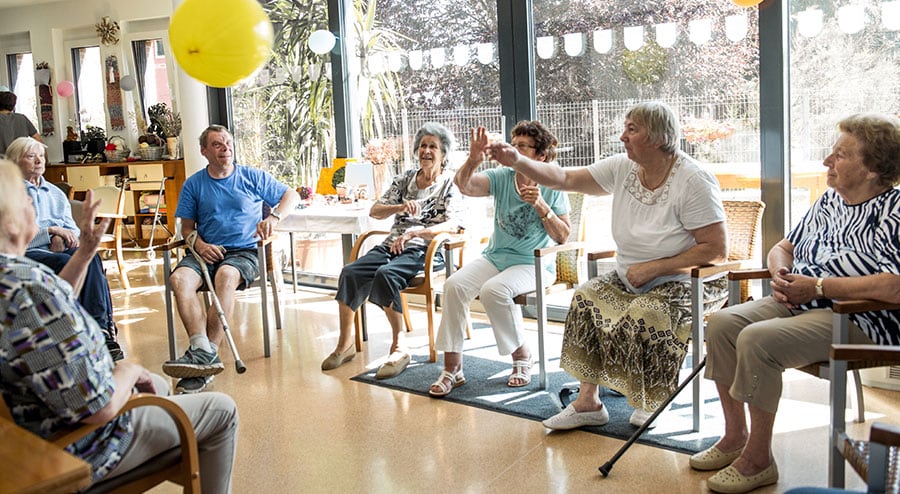Enjoy a protected and active environment in an Assisted Living home.
Enjoy a protected and active environment in an Assisted Living home.
Blog Article
Exactly How Assisted Living Facilities Enhance Quality of Life for Those With Mental deterioration
Assisted living centers play a pivotal role in enhancing the quality of life for people with dementia by carrying out customized treatment approaches that satisfy their distinctive needs. These atmospheres incorporate structured activities with emotional assistance, promoting a feeling of community while ensuring safety and independence. The combination of interesting programs and family participation better improves the residents' experience. Yet, the intricacies of mental deterioration care remain to evolve, prompting a more detailed evaluation of just how these centers adapt and innovate to satisfy the challenges faced by citizens and their families. What ramifications does this have for future care models?
Personalized Care Plans
(Dementia Care Charlotte)In a lot of cases, people with mental deterioration need tailored support that addresses their special demands and choices. Customized treatment plans are essential in assisted living settings, as they make sure that each resident obtains proper focus and solutions. These strategies are established collaboratively, involving healthcare specialists, caregivers, and relative to produce a detailed review of the individual's clinical history, cognitive capacities, and individual rate of interests.
A well-structured tailored care strategy normally consists of particular objectives related to health and wellness administration, daily tasks, and social interaction. It represents the person's cognitive decrease while promoting independence and dignity. Regular assessments and updates to the care plan are important, as they permit modifications based on the homeowner's developing problem and preferences.
Key parts of these strategies typically involve medication monitoring, behavioral support approaches, and nutritional guidelines customized to the individual's demands (Memory Care). By focusing on individualized care, helped living facilities can promote a supportive setting that enhances the top quality of life for people with mental deterioration, eventually adding to their total well-being and joy. This customized approach appreciates the uniqueness of each resident, guaranteeing they obtain the compassionate treatment they call for

Involving Tasks and Programs
Engaging locals in purposeful activities and programs is important for enhancing the top quality of life for people with dementia. These tasks not just supply satisfaction but likewise stimulate cognitive function and promote social interaction, which can minimize sensations of seclusion usually experienced by citizens.

In addition, personalized programs are crucial in making sure that each citizen's special choices and abilities are acknowledged. This tailored method urges participation, improves self-esteem, and offers a feeling of success.
Furthermore, routine analyses of homeowners' interests can assist staff modify and adjust tasks to far better suit evolving demands. By prioritizing appealing tasks and programs, aided living facilities can dramatically boost the total experience and emotional health and wellness of people living with mental deterioration.
Safe and Encouraging Environment
Creating a risk-free and encouraging environment is essential for people with mental deterioration, as it straight influences their wellness and high quality of life. Helped living facilities are created with specific attributes that promote safety while promoting a complacency and comfort. These environments prioritize accessibility, with layouts that decrease complication and motivate self-reliance, allowing citizens to browse their surroundings a lot more easily.
Safety actions, such as safe entrances and leaves, prevent straying and unapproved access, which are essential considerations for people with dementia (Memory Care). Team member are educated to identify the distinct demands of homeowners, offering tailored assistance and supervision to guarantee their security. Moreover, the unification of soothing colors and familiar objects can aid decrease anxiety and disorientation, developing a more comforting atmosphere.
Along with physical security, psychological assistance is paramount. Facilities often use team that are not just proficient in caregiving however additionally educated in compassion and communication, fostering depend on and rapport with locals. This all natural approach adds to a nurturing environment where individuals feel valued and recognized, eventually improving their overall quality of life.
Social Communication and Community
A helpful atmosphere not only focuses on safety yet likewise cultivates opportunities for social interaction and area interaction, which are vital for people with dementia. In assisted living facilities, structured tasks and common spaces encourage locals to get in touch with one another, minimizing feelings of seclusion typically experienced by those with cognitive problems.
Social interaction plays a considerable function in enhancing emotional well-being and cognitive function (Memory Care). Engaging with peers in team tasks such as video games, arts and crafts, or exercise not only promotes cognitive capabilities however likewise supports a sense of belonging. Facilities usually arrange occasions that advertise socialization, permitting citizens to develop connections and share experiences, which can be particularly advantageous for those with mental deterioration
Additionally, a vibrant area ambience can boost the general high quality of life for citizens. Staff participants are trained to facilitate interactions and support citizens in forming significant connections.
Family Participation and Assistance
Family participation check is vital in sustaining people with mental deterioration in assisted living environments. Proactively involving household members not just gives emotional comfort to locals however additionally promotes a sense of belonging and continuity in their lives. When families take part in care preparation and day-to-day activities, they contribute beneficial understandings regarding the individual's preferences, history, and needs, which can enhance personalized care.
Additionally, routine family check outs can significantly improve the emotional well-being of locals, minimizing feelings of isolation and anxiety. Member of the family can also aid in maintaining cognitive feature by involving their enjoyed ones in acquainted discussions and activities. This communication reinforces individual identity and assists citizens really feel valued and comprehended.

Conclusion
In final thought, aided living facilities considerably enhance the high quality of life for people with mental deterioration with personalized treatment strategies, engaging activities, and a risk-free setting. Jointly, these elements produce a holistic strategy to care that addresses the distinct requirements of individuals with dementia, promoting overall well-being and dignity.
Report this page